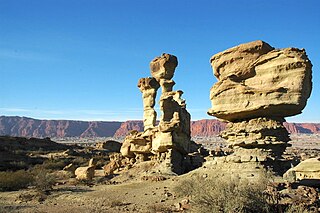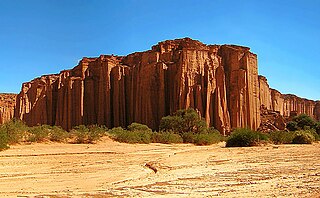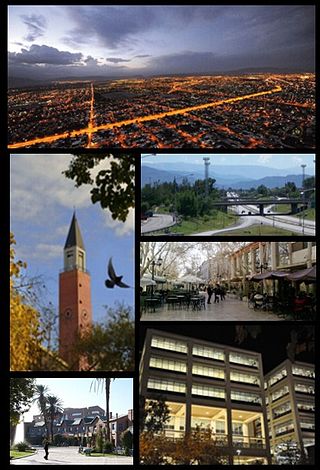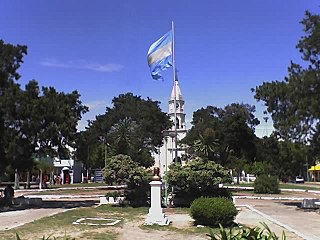
Domingo Faustino Sarmiento was an Argentine activist, intellectual, writer, statesman and President of Argentina. His writing spanned a wide range of genres and topics, from journalism to autobiography, to political philosophy and history. He was a member of a group of intellectuals, known as the Generation of 1837, who had a great influence on 19th-century Argentina. He was particularly concerned with educational issues and was also an important influence on the region's literature.

Chubut is a province in southern Argentina, situated between the 42nd parallel south, the 46th parallel south, the Andes range to the west, and the Atlantic Ocean to the east. The province's name derives from the Tehuelche word chupat, meaning "transparent", their description of the Chubut River.

San Juan Province is a province of Argentina, located in the western part of the country. Neighbouring provinces are, moving clockwise from the north, La Rioja, San Luis and Mendoza. It borders with Chile to the west.

La Rioja, officially Province of La Rioja is a province of Argentina located in the west of the country. The landscape of the province consist of a series of arid to semi-arid mountain ranges and agricultural valleys in between. It is in one of these valleys that the capital of the province, the city of La Rioja, lies. Neighboring provinces are, from the north clockwise, Catamarca, Córdoba, San Luis and San Juan. The Triassic sauropodomorph dinosaur Riojasaurus is named after the province.

Mercedes is a city in Buenos Aires Province, Argentina. It is located 100 km west from Buenos Aires and 30 km southwest of Luján. It is the administrative headquarters for the district (partido) of Mercedes as well as of the judicial district. The Catedral Basílica de Mercedes-Luján, located in the city, is the seat of the Roman Catholic Archdiocese of Mercedes-Luján.

Comodoro Rivadavia, often shortened to Comodoro, is a city in the Patagonian province of Chubut in southern Argentina, located on the San Jorge Gulf, an inlet of the Atlantic Ocean, at the foot of the Chenque Hill. Comodoro Rivadavia is the most important city of the San Jorge Basin, and is the largest city in Chubut as well as the largest city south of the southern 45th parallel.

Belgrano is a northern and leafy barrio or neighborhood of Buenos Aires, Argentina.

San Juan is the capital and largest city of the Argentine province of San Juan in the Cuyo region, located in the Tulúm Valley, west of the San Juan River, at 650 m (2,133 ft) above mean sea level, with a population of around 112,000 as per the 2001 census [INDEC].

San Juan de Lurigancho (SJL) is a district in Lima, Peru, located in the area known as Cono Este. It is Peru's most populous district, with a current population that may exceed one million.

Rafaela is a city in Argentina, located in the central-west region of the Santa Fe Province. It serves as the head of the Castellanos Department and is the third most populous and significant urban center in the province, following Rosario and the provincial capital, Santa Fe. The city is known as "The Pearl of the West" due to its natural, cultural, and architectural beauty. According to the socio-economic survey report by ICEDeL, the city's statistical institute, Rafaela had an estimated population of 111,000 in 2022.

Argentina is the fifth largest producer of wine in the world. Argentine wine, as with some aspects of Argentine cuisine, has its roots in colonial Spain, as well in the subsequent large Spanish and Italian immigration which installed its mass consumption. During the Spanish colonization of the Americas, vine cuttings were brought to Santiago del Estero in 1557, and the cultivation of the grape and wine production stretched first to neighboring regions, and then to other parts of the country.

Morón is a city in the Argentine province of Buenos Aires, capital of the Morón partido, located in the Greater Buenos Aires metropolitan area, at 34°39′S58°37′W. Located 20 km (13 mi) west of Downtown Buenos Aires, Morón is easily reached via bus along Avenida Rivadavia, via National Highway 7, and the Sarmiento railway line.

Merlo is the head city of the eponymous partido of Merlo and seat of the municipal government, located in the Greater Buenos Aires urban area of Buenos Aires Province, Argentina.

The National University of San Juan is a public university in Argentina. Its seat is located in the city of San Juan, capital of the province of the same name, in the Cuyo region. It was founded in 1973, based on several local institutions and a faculty of the National University of Cuyo.

Partido de la Costa is a partido on the Atlantic coast of Buenos Aires Province in Argentina.

Sarmiento is a department located in the south west of San Juan Province in Argentina.

Rivadavia is a department of the province of San Juan (Argentina). Located in the central southern part of Argentina, in the northeast section of the Valle del Tulum The city of San Juan is located in the west of this region, which is part of the conurbation, Grand San Juan. It is the capital city of the department of the same name, and is the government seat. It has various municipal edifices, including the police headquarters, and an important hospital, Marcial Quiroga.

Zonda Department is an administrative department of San Juan Province in Argentina. Zonda is located in the south of the province, bordered by Ullum Department to the north, Sarmiento Department to the south, Calingasta Department to the east, and Pocito Department and Rivadavia Department to the west.

Nueve de Julio is a department of Argentina, located in the south-center of the province of San Juan. Lying within the Tulum Valley agricultural oasis, almost 80% of the department's area is cultivated; it is known in particular for its production of wine and its fruit and vegetable crops.

Sanitary Works of the Nation was a state-owned company of Argentina dedicated to supplying the public with running water and sewer services. Established in 1912, the company's operation area included mostly the Buenos Aires Province area.























